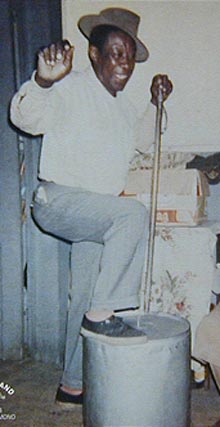
Will Shade Tribute
January 27, 2008 • Chicago, Illinois
May 3, 2008 • Memphis, Tennessee
Aug 1, 2009 • Memphis, Tennessee
Will Shade
Shelby County Cemetery opened as a pauper's cemetery in October, 1965, and Will Shade was buried in the oldest section when he died in September, 1966. [view map]
Charlie Burse
Will Shade's longest-serving bandmate, and long-time friend, was Charlie Burse. His grave in Rose Hill Cemetery was unmarked until 2019, when the Mt. Zion Memorial Fund both bought a gravestone and helped clean up the overgrown, abandoned cemetery. [view map]
Earl McDonald
A dozen years older than Will Shade, it was Earl McDonald's Louisville groups that inspired him to start the Memphis Jug Band. The National Jug Band Jubilee raised the money to buy him a gravestone in 2009. [view map]
Joe and Charlie McCoy
A dozen years younger than Will Shade, Joe and Charlie McCoy played with the classic Beale Street Jug Band, then moved to Chicago and developed an accessible ensemble sound that was a first step toward rock and roll. A follow-up to this project raised the money to buy them gravestones in 2011. [view map]
Gus Cannon
A friendly competitor of the Memphis Jug Band, Gus Cannon admired Will Shade and recorded with him several times in the 1960's. Del Goldfarb located his grave on Highway 51, a short drive south of Graceland, and organized a concert to raise funds for a new gravestone. [view map]
Furry Lewis
Another longtime friend, Furry Lewis was part of the Memphis Jug Band for a time, and, like Will Shade, lived near Beale Street for the rest of his life. [view map]
Memphis Minnie
Although her career took her to Chicago and much greater fame, Memphis Minnie played with the Memphis Jug Band, and even married Will Weldon, one of its early members. She is buried among cotton fields a couple hours south of Memphis. [view map]
Noah Lewis
Harmonica player Noah Lewis's burial location is unknown, but you can still visit the relics of the Menglewood box factory that he immortalized in his "Minglewood Blues" series of songs. If you go, watch out for poison oak! [view map]
Sleepy John Estes
Singer and guitarist Sleepy John Estes had his own jug band, the Three J's, along with Yank Rachell on mandolin and Jab Jones (who provided two of the band's three J's) on jug. His cabin has been moved to an improbable location just off Interstate 40, behind the Dairy Queen. [view map]
Mississippi John Hurt
John Hurt had no direct relationship with Will Shade, but the Jim Kweskin Jug Band recorded a version of his "Richland Woman Blues." He is buried in a family cemetery in the beautiful hill country of northern Mississippi, and the intimate Mississippi John Hurt Museum is well worth the trip. [view map]
Charley Patton
The "Father of the Delta Blues," Charley Patton helped define the genre. Some jug bands play his song "Shake It and Break It," but he had no direct connection with Will Shade. However, his gravesite is worth a visit on a trip through the Delta. [view map]
Sam Chatmon
As part of the Chatmon family that contributed various members of the top-selling Mississippi Sheiks, Sam Chatmon helped contribute to the jug band repertoire. He lived in Hollandale until 1983 and was buried a few blocks from his last residence. [view map]
Blind Boy Fuller
Fuller (born Fulton Allen) made a living as a street performer in Durham, North Carolina. He often played with jug band instrumentation, including his own kazoo, harmonica by Sonny Terry or washboard by Bull City Red. A few of his songs, including "Rag Mama Rag" and "Step It Up and Go," have become jug band standards. [view map]
Tampa Red
With his partner Georgia Tom, Tampa Red helped create the "hokum" genre that was like a more urbane version of jug band music. He was an early player of National resophonic guitars and pioneered a sophisticated slide guitar style, while also accompanying himself on kazoo. Many of his songs, like "Tight Like That" and "Beedle Um Bum," are still played by modern jug bands. [view map]
Frankie "Half Pint" Jaxon
Born Frank Devera Jackson in Montgomery, Alabama, Jaxon made his way to Chicago where he recorded wonderfully entertaining vocal parts with the Harlem Hamfats, Tampa Red & Georgia Tom, and his own band the Quarts of Joy. He served in World War I, and took an office job with the US military during World War II, earning him a veteran's gravestone in the Los Angeles National Cemetery. [view map]